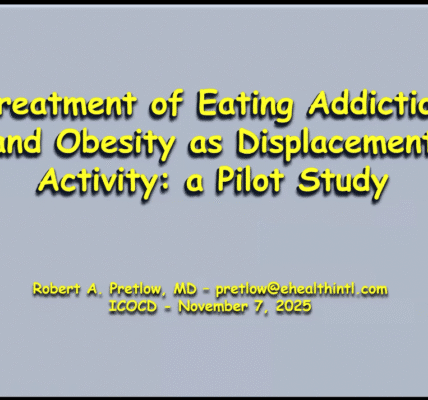Does Transfer Addiction Validate Displacement Theory?

There is a disappointing side effect of bariatric surgery for weight loss. “[U]p to 30% of patients who have had bariatric surgery” experience transfer addiction. That’s according to the Obesity Action Council (OAC), a national nonprofit organization with over 85,000 members dedicated to serving the needs of the obese.
Transfer addiction happens, according to the OAC, when patients substitute eating addiction for a new addiction:
For these patients, food is no longer being a source of comfort, distraction, reward or escape. Other behaviors or substances now substitute for eating, and can become problematic.
An incredible study examining the causes of transfer addiction was led by Dr. Kenneth Blum from the McKnight Brain Institute at the University of Florida, with the results published in the Journal of Genetic Syndromes & Gene Therapy. Researchers found that addiction transfer was likely the result of reward deficiency syndrome (RDS), a term coined at the McKnight lab to describe “common genetic determinants in predicting addictive disorders.”
The researchers found that the risk of weight regain after surgery is a serious problem and that “when determining eligibility for bariatric surgery for extremely obese patients, psychiatric screening is crucial; it is also central to postoperative success.”
Half of bariatric surgery patients are depressed, according to the study, with a fivefold increase in depression for those with a BMI greater than 40kg per square meter.
This doesn’t mean that bariatric surgery is not an effective treatment for weight loss for severely obese persons. The researchers point out that bariatric surgery is effective at:
- long-term significant weight loss
- dramatic improvement in quality of life
- reduction or reversal of hypertension, sleep apnea and diabetes
- an extension of life span
Some of the gains, however, have come with the surprising onset of addiction transfer. Patients acquire new addictions they did not previously suffer from, including alcohol use disorder, substance use disorders, gambling disorder, shopping disorder, and even sex and exercise addictions.
The fact that new addictions arise when surgery prevents overeating demonstrates the power of displacement, the force driving compulsive behaviors. With the eating channel blocked, the person still needs to displace the stress that was dissipated through eating. The fact that patients can substitute a behavioral addiction for a substance addiction makes it clear that all addictions are behavioral addictions to a large degree.
Further evidence that displacement is behind addiction transfer is the role of habit substitution in addiction treatment and recovery. People recovering from substance use disorders and other compulsive disorders are advised first and foremost to break patterns of routine that generate cravings.
Many recovering addicts isolate themselves, for example, at rehabilitation facilities to remove themselves from environments full of temptations, triggers, and cues. Some patients relocate or change jobs to escape places that encourage compulsive behaviors. All people in recovery are encouraged to develop healthy substitute habits to provide the dopamine boost that compulsive behavior used to provide.
The neurotransmitter, dopamine, is triggered by all manner of addictions and rewards. “Dopamine receptor levels were found to have an inverse relationship with the body mass index of the subjects,” report the McKnight researchers, “predisposing subjects to look for reinforcers.” The researchers describe the process of displacement:
[I]n the case of drug-addicted subjects, the drug and in the case of the obese subjects, food is a means to temporarily compensate for a decreased sensitivity of [dopamine] regulated reward circuits.
Researchers also found that, in many ways, eating addiction is a substitution for other addictions. The amount of alcohol consumed is inversely related to BMI, indicating that obesity is a sort of prophylactic against other compulsive disorders. The fact that ramping up one compulsion might ratchet down others is proof that compulsive behavior is moderating displacement that will seek a new outlet if the usual outlets are blocked.
Addiction transfer is not unique to bariatric surgery patients. The Betty Ford Center found that a quarter of those who relapse after treatment for alcohol use disorder switch to other drugs, such as opiates. Again, the substitution is an indication that displacement will find a way, and that the key to recovery may be substituting safe habits for problem habits.
The fact that people using GLP-1 drugs for weight loss regain the weight when they stop using the drugs is another indication of displacement finding a way. In order to have a successful recovery from eating addiction, substance use disorders, or other compulsive behaviors, patients have to learn safe ways to displace stress.
Many of the healthy habits used to displace stress can themselves become addictive. Running, golfing, walking, biking, climbing, swimming, and hundreds of other sports can become compulsive, which is sort of a wonderful thing. Their appeal can be strong enough to keep the mind off contemplating prohibited activities.
Even such things as crossword puzzles, jigsaw puzzles, number games, and word games can be used in a flash to ward off a craving and, over time, become mostly harmless transfer addictions. Meditation, mindfulness, mantras, yoga, rhythmic breathing, and contemplation are all soothing in the moment and can become habit-forming ways to displace stress over time.
In conclusion, addiction transfer is evidence of the process of displacement, and it can also be harnessed in the treatment of addictive and compulsive disorders.
Written by Steve O’Keefe. First published October 1, 2025.
Sources:
“What is Transfer Addiction? An in-depth look at a hidden risk of weight loss surgery,” InvestigateTV, September 21, 2025.
“Neuro-Genetics of Reward Deficiency Syndrome (RDS) as the Root Cause of ‘Addiction Transfer’: A New Phenomenon Common after Bariatric Surgery,” Journal of Genetic Syndromes & Gene Therapy, December 23, 2011.
“Transfer Addiction Following Bariatric Surgery,” Obesity Action Council, April 19, 2016.
“The New Science of Addiction,” The Wall Street Journal, July 18, 2006.
Image Copyright: alsimonov.




